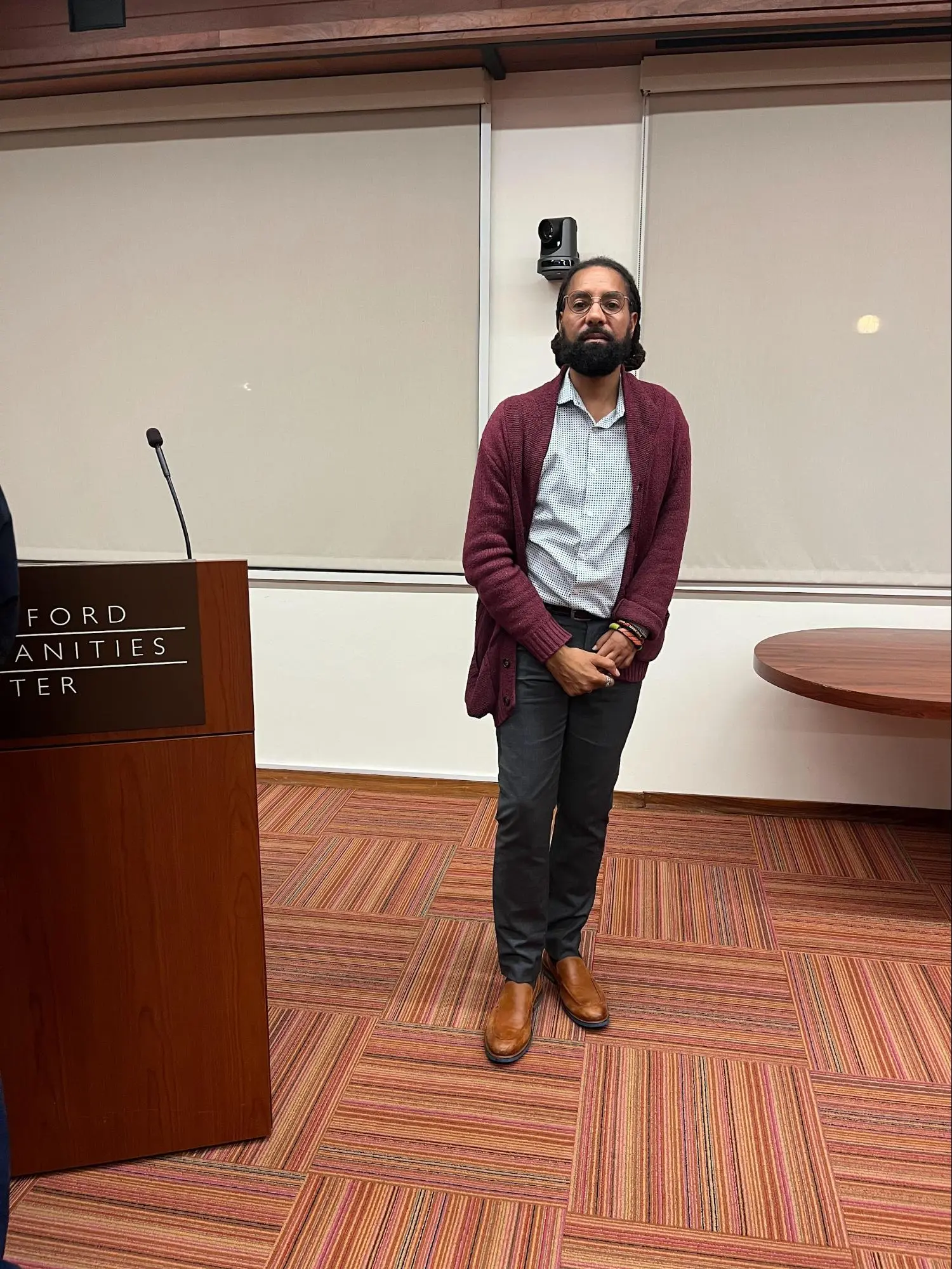The walls of Levinthal Hall in the Stanford Humanities Center were filled with the verses of Mohr Visiting Poet L. Lamar Wilson, whose reading invited listeners on a journey through themes of race and queerness.
Wilson, a Florida A&M University alumnus, worked as a journalist for 20 years before starting their career as a poet. They were, in their own words, a “poet as a journalist.” Their work was featured during an event co-sponsored by the Creative Writing Program and the Humanities Center on Wednesday.
Wilson’s debut book, “Sacrilegion,” was selected in 2012 for the Carolina Wren Press Poetry Series, then the Independent Publishers Group bronze medal and Thom Gunn Award finals in 2013. Wilson also co-wrote “Prime: Poetry and Conversation” and collaborated with Rada Film Group to create “The Changing Same,” an acclaimed POV short film.
Nicholas Jenkins, the director of Stanford’s Creative Writing Program, opened the evening by noting the importance of an audience. He said the reading with the Mohr Visiting Poet is a yearly highlight. Jenkins then presented an introduction written by A. Van Jordan, the 2023-2024 Mohr Visiting Poet, who described Wilson as a “true artist and Renaissance man for the 21st century.”
The reading then commenced with three poems selected from Wilson’s “Sacrilegion.” The first was titled “It Could Happen to Anyone: A Letter to a Boy,” which followed a young speaker interviewing someone living with HIV. The poem underscores the vulnerability of both the interviewer and the interviewee, in addition to the generational and societal impacts of HIV and the precariousness of life.
The work was followed by “Lost and Found in Tallahassee,” which Wilson said was based on the very first story they ever wrote. The poem was what they wished they had included in that original story. After all, “memory is the original fiction — we’re always trying to correct the record,” according to Wilson.
The final of the three poems read was “Resurrection Sunday” — the central poem of Wilson’s film “The Changing Same,” which was nominated for a Pushcart Prize in 2012. The poet said they normally do not share this poem in “spaces like these,” but they felt comfortable doing so with the Stanford audience.
In the poem, Wilson uses metaphors of pornography and lynching to express the speaker’s deep conflict with their sexuality in a church setting. Pornography represents the exploitation and shame surrounding desire while lynching symbolizes the violent judgement and oppression of Black queer bodies. When Wilson finished reading the poem, they revealed they saw the poem as a failure because they would often get hit on after reading it — this made the audience laugh.
Wilson then dove into “Negus in Paris,” noting they had moved to Paris for the summer from their hometown of Marianna, Fla., after feeling unsafe given the 2016 election results. According to Wilson, “Negus” is a term meaning “king” derived from the Ethiopian Semitic languages, from which the N-word evolved. The title is also a nod to the infamous Jay-Z and Kanye West song.
Wilson contrasted the historical richness of the term “Negus” with the contemporary use of the N-word. They explored how Black identity is shaped by both oppressive histories and modern culture. The poem reflects on the complexities of being Black in global spaces — specifically in Paris, which has its own colonial past. His writing also examines the intersections of race, language and power. Wilson read it aloud in a prideful tone, exuding reclamation.
Wilson was commissioned by the Hemingway Society to respond to novelist Ernest Hemingway who is often critiqued for the latter’s portrayal, or lack of, Black characters and racial dynamics. Wilson revealed they had read their poem “Hemingway’s Boys Are” to the Hemingway Society in Spain in July. In the poem, Wilson reflects on the influence of Hemingway’s archetypal “manly” figures and contrasts them with the experiences of marginalized, queer Black men.
The last piece that Wilson presented was a chapter from their forthcoming memoir-in-progress. In the chapter, Wilson recalls when they last walked out of the newsroom after a 20-year career in journalism.
“Journalism is dead,” they said. “And I won’t have any part of it.”
When asked by an audience member when the memoir would come out, Wilson replied, “I’m never done. I’m still writing it, but I hope to finish it this year.”
